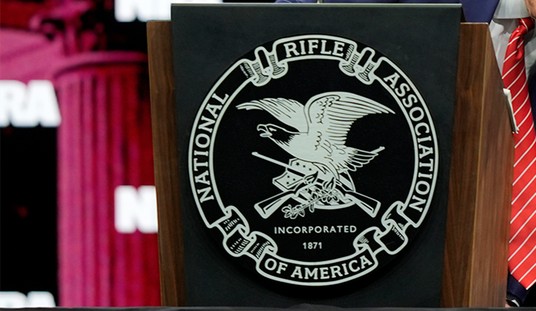As anticipated, Nancy Pelosi brought a pair of gun control bills to the floor of the House on Wednesday afternoon, offering limited debate on both proposals. The House first took up H.R. 8, the so-called universal background check bill for an hour’s worth of debate before moving on to H.R. 1446; the proposal by Rep. James Clyburn (D-SC) that would allow the FBI to take ten business days to conduct an “instant” background check, while requiring the gun seller to petition the government to allow the sale to proceed if the FBI doesn’t respond within the allotted time period.
Republicans largely framed their arguments against both proposals as a defense of the Second Amendment, while Democrats argued that the bills are just a “common sense” measure that wouldn’t have any impact whatsoever on the right to keep and bear arms.
#HR8 DOES NOT address the root causes of gun violence and will not actually prevent criminals from obtaining guns.
H.R. 8 DOES gut the 2nd Amendment Rights of law-abiding gun owners. WATCH: pic.twitter.com/zEjkoQrLXT
— Rep. August Pfluger (@RepPfluger) March 10, 2021
"Now my Democratic colleagues, after defunding the police, opening up our borders, want to take away our God-given right, yes God-given right, to defend ourselves under the Second Amendment."
Rep. Roy's full floor speech against Democrats latest gun control efforts: pic.twitter.com/tXogzlhARY
— Rep. Chip Roy Press Office (@RepChipRoy) March 10, 2021
Rep. Andrew Clyde of Georgia, a gun store owner himself, responded to those assertions by pointing out the fact that the ten business day wait in H.R. 1446 could easily turn into “days or weeks,” as he noted that many offices were forced to close for periods of time because of COVID over the past year. That would have a chilling effect on the rights of law-abiding Americans to purchase a firearm.
Rep. Sheila Jackson Lee, on the other hand, graphically described the shooting at Emanuel Baptist Church in South Carolina. Jackson Lee and other Democrats maintain that, because the killer in that shooting obtained a gun after the three-day waiting period had expired, that the killings could have prevented if H.R. 1446 had been in place. In actuality, that killer should have been stopped long before the three day period had expired. As a judge has explained, it was “abysmally poor” policy decisions that allowed the sale to proceed.
“The FBI’s background check system is disturbingly superficial, excessively micromanaged by rigid standard operating procedures, and obstructed by policies that deny the overworked and overburdened examiners access to the most comprehensive law enforcement federal database,” Gergel wrote in his ruling to dismiss the lawsuits..
In Roof’s case, a background checker ran his name through the National Instant Criminal Background Check System (NICS) on April 13, 2015, finding Roof had been arrested more than a month earlier on a felony drug charge.
Roof’s rap sheet showed the arrest was made in Lexington County, so the background checker reached out to two separate Lexington County law enforcement agencies for the incident report on the arrest.
However, the arrest was actually made by the Columbia Police Department within a section of Columbia city limits lying in Lexington County. The two Lexington County law enforcement agencies told the examiner that.
But the background checker couldn’t find contact information for a Columbia Police Department in Lexington County. That’s because the Columbia Police Department is listed in the FBI’s records exclusively as a Richland County agency, according to a July 2015 statement by then FBI director James Comey.
“A simple Google search would have produced the contact information for the Columbia Police Department,” Gergel wrote.
But FBI policy doesn’t allow background checkers to use internet search engines during criminal history investigations, according to Gergel.
Furthermore, Gergel says there’s no expectation or requirement of FBI background checkers to follow up if they don’t get necessary records when researching criminal histories.
“This may not have met the most minimal standards of common sense or due care, but the examiner did not violate her agency’s policy,” Gergel wrote in his Monday ruling that the FBI had not negligently broken protocol.
The answer, then, lies not with further burdening the rights of Americans to purchase a firearm, but to fix the problems within the NICS system itself. Gun owners are being turned into scapegoats when the blame lies with the federal government itself.
When it comes to H.R. 8, legal gun owners are being turned into scapegoats when the real blame lies with violent criminals, who aren’t going to go through a background check before they steal a gun or get a gun on the black market.
H.R. 8, the Bipartisan Background Checks Act, will keep dangerous weapons out of the hands of the most dangerous people. We must pass this vital gun violence prevention legislation to ensure all Americans have the right to return home safely. pic.twitter.com/Wz0BsjHOaK
— Rep. Eric Swalwell (@RepSwalwell) March 10, 2021
Notice that Eric Swallwell promises that the background check bill will actually “take guns” out of the hands of dangerous people, but he never actually explains how exactly the bill would do that. Honestly, he can’t, because H.R. 8 won’t stop a single illicit private transfer of a firearm, much less take a gun from a prohibited person. How could it? How could the government become aware of, much less prevent, a private gun sale without a background chec k from taking place; at least not without expanding the surveillance state that Communist China would look like a libertarian paradise in comparison?
The debate over the gun control bills in the House was limited to just a few hours on Wednesday afternoon, with final votes on both H.R. 8 and H.R. 1446 expected to come on Thursday. The question isn’t whether or not the bills will pass the House, but whether they’ll draw any support from Republicans or any opposition from Democrats before they head to the Senate, where their prospects are less assured of success (though very much a priority for the Biden administration as well as an issue that Joe Manchin has been supportive of in the past). A vote to amend H.R. 1446 garnered a handful of Republican votes, but it’s unclear whether all of them will vote in favor of the final gun control proposals on Thursday.









Join the conversation as a VIP Member